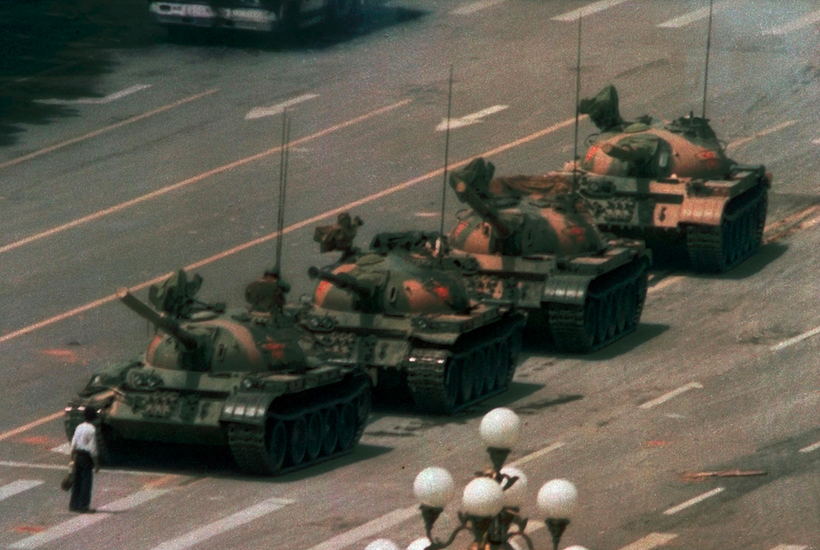If you need any further evidence that time indeed flies, on Tuesday we will remember the thirtieth anniversary of the Communist Party of China sending tanks against its own people to crush the peaceful pro-democracy protests centred around Beijing’s Tiananmen Square.
Who can forget the lone Chinese man, with his two bags of shopping, standing astride the middle of the street, stopping a column of People’s Liberation Army armour (and what a sad irony that name is)? It has become one of the most iconic images of the twentieth century and a powerful illustration of a struggle between an individual and a totalitarian government.
There but for the grace of God went the Eastern Europe and the Soviet Union. Sadly, China did not have its own Gorbachev; Marxism might have been pretty weak in China but Leninism certainly triumphed that day.
And it continues to do so. There has been a lot of water under the bridge; China is far wealthier and far more important three decades on but it’s still not free. The people who sent in the troops against their own people are still in power and appear to have few regrets. The world doesn’t particularly care either; China is far too important to the international economy. Those tanks with bloody tracks haven’t stood still either. The People’s Liberation is much more dangerous and capable today than it was at the end of the Cold War.
It’s yet another sign of forgetting that two Australian Football League teams are playing an away game in China today, with Port Adelaide and St Kilda clashing in Shanghai as part of this week’s round of the 2019 AFL championships. Why not play at Tiananmen Square?
Playing China was Port’s idea. Port Adelaide’s chairman is the cuddly breakfast TV personality, David Koch, and the Club’s director is the former Liberal minister Amanda Vanstone, who was a five-year veteran of the Senate and a shadow minister in June 1989 who supported the successful motion where the Australian Parliament expressed “its outrage at the massive and indiscriminate slaughter of thousands of unarmed Chinese pro-democracy demonstrators and bystanders by units of the Chinese People’s Liberation Army in Beijing on 4 and 5 June 1989.”
Time clearly heals all wounds, smooths out old concerns – and creates new business opportunities.
In yesterday’s “New York Times”, the multiple-time imprisoned and now exiled Wang Dan, one of the student leaders of the 1989 protests, reflects:
Our movement failed 30 years ago because we lacked support and experience in promoting democratic change. Many of us had pinned our hopes on the liberal factions of the Communist Party leadership to initiate changes from within the system, but we underestimated the power of the party elders. The massacre shattered our illusions, helping us see the brutality of China’s one-party rule.
We students were not the only naïve ones. Within a few years of the Tiananmen massacre, many Western governments lifted their sanctions against China. The West’s engagement policy — based on the hope that trade and investment would bring about democratic changes in China — prevailed.
But instead of instigating liberalization, Western capital fattened the pockets of the Communist Party leaders, giving them the power to prolong their rule by silencing dissent at home and expanding the country’s global clout…
As the United States-China trade war unfolds, I see a tremendous opportunity to make political reform a part of the negotiations. In the 1990s, when Washington linked the granting of China’s most favorable trading status with human rights, the Chinese government bowed to the pressure by relaxing its political control and releasing me and several other dissidents. But once trade and human rights were delinked, the situation there deteriorated drastically.
Today, dissidents are being imprisoned and forced to confess on national TV. The government monitors and censors the political views of students studying abroad.
In a perverse way, President Trump’s tough stance against Beijing, despite its unpredictability, is proving effective. Through this trade war, I hope Washington will show the Chinese leadership that the West will not tolerate the use of technology for spying and controlling ordinary citizens.
We have normalised and learned to live with a dictatorship – perhaps that was inevitable, considering China’s growing clout – but worse still, too many people have been trying to persuade us that today’s China and its rulers are all hunky dory and we should cultivate them as friends and partners.
This is a country that keeps ten per cent of its Muslim minority – one million people – in reeducation camps and will soon subject its entire population to a high-tech Orwellian system of surveillance and control, stick and carrot. But the allure of the red gold is very strong; too strong for many to resists.
Perhaps that’s something for the moneymen of the AFL to think about as the Power and the Saints kick their blood-red Sherrin around Jiangwan Stadium.
Arthur Chrenkoff blogs at The Daily Chrenk, where this piece also appears.
Got something to add? Join the discussion and comment below.
Got something to add? Join the discussion and comment below.
Get 10 issues for just $10
Subscribe to The Spectator Australia today for the next 10 magazine issues, plus full online access, for just $10.


























Comments
Don't miss out
Join the conversation with other Spectator Australia readers. Subscribe to leave a comment.
SUBSCRIBEAlready a subscriber? Log in